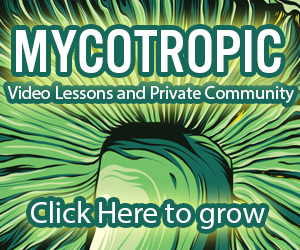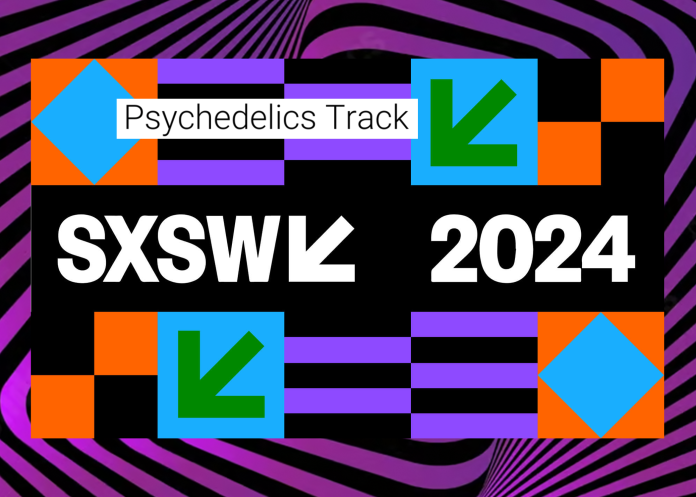I’m frozen amidst a steady stream of Patagonia vest and denim jean attired tech executives walking towards me, caught like a Texas native white-tailed deer in the headlights of an autonomous delivery robot at the front of their pack. It’s a Wild West style showdown – just the robot and I, mano a machino as the parting sea of SaaS C-suiters diverts around us to continue the gentrification of Austin.
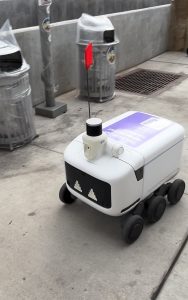
I fake left, stutter-step to the right and find a pocket to maneuver through. It feels like I’m a fullback running through traffic in the Enhanced Games – The robot continues on its path of totality, delivering IV drips and Vitamin B12 shots to a brand activation for a purveyor of non-psychoactive microdoses.
Maybe the presence of this autonomous delivery robot explains why there seems to be far fewer people and much less chaos than I remember from the initial days of my inaugural SXSW the year prior – all the executive assistants, beancounters and +1’s have had their positions offshored and automated to create a more seamless and artificially intelligent corporatocracy.
There’s a metaphor here for one potential outcome of the ‘psychedelic renaissance’ – One in which the mental health crisis facing humanity is eliminated by winnowing away the human experience itself until an automated, rigidly controlled delivery mechanism is all that remains.
But then again, that timeline doesn’t stand much of a chance in the face of the brilliant diversity of thought and intelligence coloring the global psychedelic community at large. And when we have the good fortune to break bread together and put in some face time, a lot of potential issues tend to get solved very quickly.
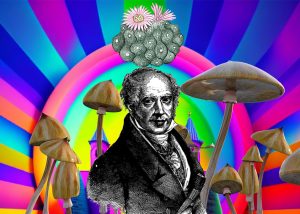
I’m coming down off of four days in Austin at South By Southwest, where I moderated a panel called “Psychedelic Entrepreneurship and the Underground Economy” for the psychedelics track at the conference. It’s over a week later, so that should say something about how much of a peak experience the whole shebang was considering it’s taken me this long to process a small amount of what happened at the conference. That and I’ve been bouncing around Panama with little to no down time since my departure from Austin.
To be perfectly clear, “conference” is perhaps too stuffy a framing for what I experienced at SXSW 2024. While there was a veneer of professionalism and intellectual humility across the panel circuit, the long weekend had more overlap with a Fear and Loathing style Vegas bender than it did with white collar networking and resume building. I’m of course speaking purely for myself here.
As the saying goes, “Keep Austin Weird” – not W.E.I.R.D (the white, educated, industrialized, rich, and democratic kind of weird that psychedelic clinical trials seem so hell-bent on preserving) but weird as in ‘hey, let’s exercise our cognitive liberty and bring a merry prankster element to the table of biotech executives focused more on Phase 2b clinical trial results than phases of 2C-B self-administration trials.

In a world that increasingly feels “us vs. them”, I still (perhaps naively) believe it’s only Us and Us; both ends of the cognitive liberty vs. control group spectrum can, and must co-exist.
The current thrust in psychedelic mainstreaming seems to be intent on swinging the pendulum from the unregulated free for all hippy sabotage of the 1960’s to the other extreme: state-regulated and iron-fisted control over psychoactive molecules and the people who use them.
But isn’t a pendulum swing from one extreme to the other just as short-sighted and one-dimensional as the “failed experiment of the 1960’s”? If the hippies indeed failed as at least one disgraced psychedelic medicalization carnival barker has publicly declared on numerous occasions, well then you better not be reading this on a Macbook, iPhone, or Windows enabled desktop (does anyone still use those?). In fact, I hope you’re not driving a Tesla Cybertruck, wearing Patagonia attire or fond of virtually any good music made in the last half century either.
SXSW Panel Highlights
I attended a half dozen of the panels over the weekend, with the remainder of my time in Austin spent schmoozin’ and boozin’ – I am not a ‘psychedelic exceptionalist’ by any means, and still love a smoky mezcal – especially when it’s comped by a flashy AI startup keen on burning through their friends and family financing round with open bars and hors d’oeuvres at a rooftop venue on 6th Street while trying to make an impression on hipsters who have the majority of their net worth tied up in their vinyl record collections.
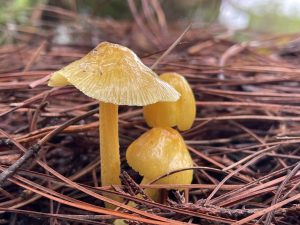
The “MDMA Saved My Life: Psychedelics & Healing From Sexual Trauma” panel featuring Dr. Melissa Barker, Sutton King, Sunny Strasburg and moderator Dr. Cat Meyer showcased powerful testimonies of women who have tapped into the healing power of MDMA to overcome the sexual abuses they’ve endured. The panel opened with a sobering land acknowledgement by Sutton King, reminding us that we are standing on the shoulders of giants who have largely been sidelined and ostracized in the rush to patent and monopolize psychedelics. “I am not my story” was a particularly impactful statement that surfaced during the hour-long discourse, which gives rise to the possibility of transcending abuses of power on the personal and collective level.
Another example of the diverse programming on offer throughout the three days of psychedelic programming was the “Healing Journey: Sacred Medicine & Men of Color” panel featuring Victor Cabral of Naropa Center for Psychedelic Studies, Facilitator and Integration Coach Jonathan Brown, Tandava Retreats founder Joel Brierre and moderator Charlotte James. The panel offered a refreshing counterbalancing of marginalized perspectives and lived experiences to the often overrepresented biotech and venture fund worldview that worships anglo-centric scientific reductionism, profit over people, and establishment values in general.
This uplifting of BIPOC narratives marked an extremely valuable contribution to the psychedelics track at SXSW 2024.
The biotech and pharmaceutical sector of the psychedelic movement was of course well-represented across a variety of panels throughout the weekend, with perhaps none more captivating than “Beyond MDMA: Funding The Future of Transformative Medicine” featuring Ani Chahal of Unity & Imagine Fund, Divya Chander of Singularity Group, Adrienne Jo of Palo Santo Fund, and moderator Julie Holland. Among breakthroughs in the development of novel molecules classified as entactogens aimed at disrupting “The friendship recession” and the challenges of psychedelic drug development startups balancing the need for substantive funding with long timelines to delivery, I learned about the mounting importance of ‘Neuro Rights’ – the last frontier of privacy, and one which is under threat of co-option with the rapid emergence of neurotechnologies potentially enabling the recording and rewriting of an individual’s neuronal activity. In other words, the inverse of cognitive liberty.
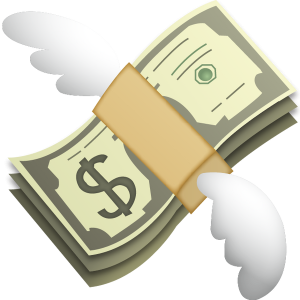
Perhaps the most fascinating panel I attended and wasn’t on stage for was titled “Who Governs Psychedelics in 2030: Medicine vs. Mysticism” featuring moderator Dillan DiNardo of Mindstate Design Labs, Johns Hopkins Senior Lecturer and journalist Neşe Devenot, writer and podcaster Zach Leary, and Meow Wolf founder Vince Kadlubek. This panel exhibited a refreshing critical analysis of the emerging psychedelic establishment, centering the importance of maintaining a healthy skepticism and dissidence towards the medicalization of psychedelics and placing emphasis on their value in non-clinical creative exploration, experimentation and decentralized peer-to-peer connections aimed at fostering resilient communities and personal growth.
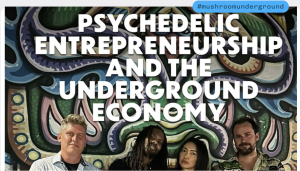
For my contribution to the conference, I moderated a panel called “Psychedelic Entrepreneurship and the Underground Economy” –
I kicked off the panel with a trust building exercise.
“Who here is personally familiar with the effects of psilocybin mushrooms?” I inquired of the substantive audience comprising arguably the most intelligent, affluent demographic in the world.
Every single hand in the mostly full room went up.
“How many of you have exclusively procured said psilocybin mushrooms from state-sanctioned, strictly legal sources?”
One lonestar hand out of the entire crowd remained up. I asked them after the conference where they got the mushrooms, and they mentioned they sourced them from a church run by a personal friend of mine. I didn’t have the heart to break it to them, but their source is…certainly not state-sanctioned and strictly legal.
Fellow panelist and disruptor Reggie Harris of Oakland Hyphae hit on the fact that people in Texas and around the world are still being incarcerated and having their lives upended and families destroyed over possession and distribution of the same substances that the emerging psychedelic industry is openly trying to cash in on, and that social justice activists deserve to be as much a part of the ‘access conversation’ around psychedelics as first responders and military veterans currently are.
“I was an angry black man until I took MDMA” said Harris in a particularly powerful testimony.
Journalist Mary Carreon offered the perspective that ‘psychedelic exceptionalism’ needs to be unpacked and reconsidered as the driving force in our movement in that drugs themselves are neither moral or immoral; criminalizing and stigmatizing certain substances as inherently ‘good or bad’ is a false binary that has arguably done far more harm than healing.
Panelist Bob Johnson of Mycroboost functional mushroom supplements offered a humorous and fitting observation that “these pharmaceutical companies have spent hundreds of millions of dollars over multi-year timelines and still don’t have a product to sell.”
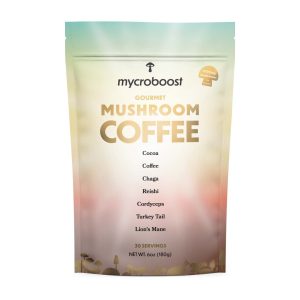
It’s a curious case that in spite of these 7 year plus, multi-billion dollar drug development efforts, everyone and their mother still has access to psychedelic substances and they keep coming back for more. While it’s entirely possible that ‘Next Generation Psychedelics’ will be a good fit for many people, the current iteration of psychedelics in their unadulterated state aren’t having any trouble capturing people’s imaginations and wallets regardless of their regulatory scheduling and unsanctioned status.
In the meantime, the FDA designation of MDMA and psilocybin as breakthrough therapies in 2017 and 2018 kicked off a massive wave of cultural interest and subsequent decentralized supply and demand boom that no regulatory body was or is prepared to deal with. Only time will tell who will control the future of psychedelics, but the genie is so far out of the bottle that trying to derail the momentum of the underground economy is like shooting a water gun at a bullet train.
The Afterparties Were Lit AF
The carnivalesque nature of the satellite events and afterparty offerings felt like a 21st century version of the annual traveling fair that descended upon Macondo in Gabriel Garcia Marquez’s ‘One Hundred Years of Solitude’. All manner of legacy and next gen product, molecule and curiosity enveloped Austin with little time to make sense of it all.
There’s a shakeout happening in the psychedelic world, and I’m not just talking about the high vibe dance party at the Center for Shamanic Education fundraiser. The hype bubble has burst, and ultra-fancy $100 million dollar startups are being outlasted and outcompeted by bootstrappers with a better product – especially if that product is raw, unadulterated psilocybin mushrooms grown in cow manure.
Psychedelics must never lose their personalized, eccentric and utterly baffling edge if they are to truly live up to the unrealistic expectations that so many proponents of systematizing and demystifying them have suggested. We can stop acting like psychedelics need to be made into a binary ‘us and them’ set of solutions. I understand and appreciate the potential for non-psychedelic DMT and patented, yeast-derived synthetic psilocybin analogue experiences facilitated in an REIT controlled state-licensed clinic to help first responders come to terms with their position as the enforcement arm of the ruling class and for special ops forces to be quicker to the trigger – but I will personally choose to be blasted into hyperspace among quixotic and bedazzling entities and rapidly evolving hieroglyphics on my own terms every time. I don’t advocate for drug use; I’m a proponent of ‘better living through chemistry’.
The psychedelics track at SXSW did in fact have something for almost everyone. I’m proud of the way this ‘industry’ is maturing, but also a little bit terrified. As long as the molecules themselves survive the cultural mainstreaming of psychedelics, there will always be a safe haven for the offbeat, the neurodivergent, and the cognitive dissidents to ‘find the others’ and make a strange sort of sense of the world in ways that don’t dilute and dismiss the ecstatic nature of our existence.
And if you’re a biotech or Pharma executive reading this, I would love to break bread with you at a nice dinner that you pay for.



